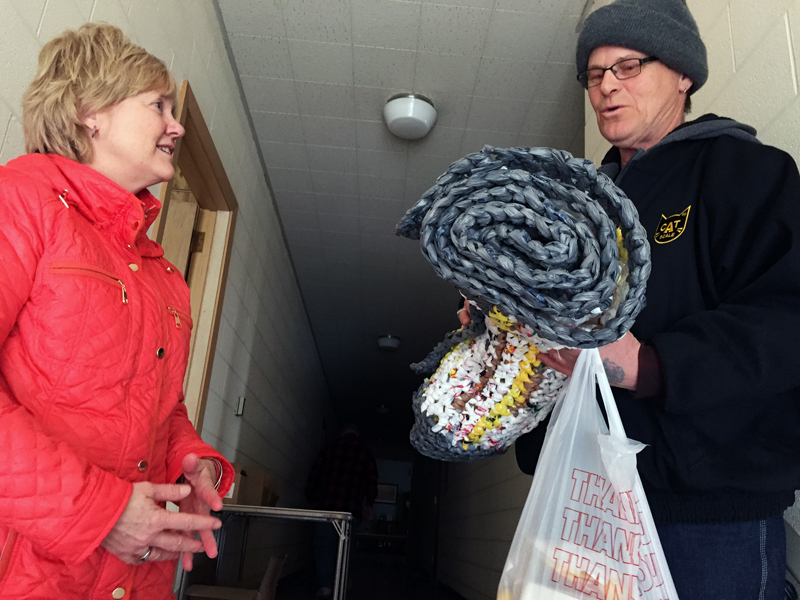
Matthew receives a plastic, hand-woven mat, along with a sack lunch from Lori Freudenberg, community outreach director for the Franciscan Peace Center in Clinton, inside the Clinton Masonic Center during Share our Sandwiches on March 23.
By Barb Arland-Fye
The Catholic Messenger
(Editor’s Note: More than 12,000 people experienced homelessness in Iowa in 2015, according to the Institute for Community Alliances. In this article, the fourth in a series, The Catholic Messenger explores the shortage of affordable housing in Clinton and efforts to alleviate that shortage.)
CLINTON — “Miss G” picks up a free sack lunch and some baked goods sitting on a card table inside the doorway of the Clinton Masonic Center on a chilly March day. The Sisters of St. Francis provide the food and a few other basic necessities through their Share our Sandwiches ministry at this downtown site and one on the city’s southwest end. Miss G is employed as a financial services advisor but is currently on short-term disability, leaving her with limited financial resources herself. “I’m living in my parents’ basement … to have a roof over my head,” the 36-year-old Clinton resident says. The search for affordable apartments has been discouraging, so far. Rent “has to be under $400 a month for me to afford an apartment. That’s impossible to find.”
The city of Clinton, population 26,885, is the largest city in Clinton County and one of 28 counties that received a “poor” rating for housing affordability in the United Way of Iowa’s ALICE Study of Financial Hardship (2016). Affordable housing, in general, means that an occupant pays no more than 30 percent of his or her income for gross housing costs — including utilities, according to the U.S. Department of Housing and Urban Development (HUD).
On a chilly March night at St. Boniface Center in north Clinton, 90 people gathered for a simple soup supper and to listen to a presentation on affordable housing as part of the Peace Soup Lenten series. This year’s theme is Our Invisible Neighbors. “We chose topics that are essential to understanding the difficulties that so very many of our neighbors, our brothers and sisters are faced with … namely ‘homelessness,’” explained Gabriela Egging, one of Peace Soup’s organizers. “We wanted to explore what are the options for these people as far as shelter is concerned and what is necessary to them to get into a home.”
“Homelessness is a huge issue … it’s like an onion, cutting into it one layer after another,” explained Lori Freudenberg, community outreach director for the Franciscan Peace Center. She and Deb Vath, executive director of the Clinton Housing Authority, shared their insights on homelessness and affordable housing with the Peace Soup audience. The Sisters of St. Francis and Pax Christi of Prince of Peace Parish, both in Clinton, sponsor the series.
“Many wonder, why aren’t these people pulling themselves up by the bootstraps? There are four basic reasons for becoming homeless,” Freudenberg said: “economics, mental health and substance abuse, loss of support network, and discharge from jail or armed services.”
Matthew, for example, got out of jail a couple of months ago. He had been driving while barred. “A man’s got to work,” he said, referring to the need for transportation while searching for jobs. Meanwhile, the 55-year-old is living in an apartment with his ex-fiancé and her brother. “I just grit my teeth,” he said, explaining the unusual living arrangement while picking up a sack lunch at Share our Sandwiches. He also picks up a plastic, hand-woven mat, just in case he needs to sleep outdoors.
One of the initiatives in which Freudenberg has been involved with, “Getting Ahead in a Just Getting By World,” strives to equip people with the skills they need to rise out of poverty. About 100 people have graduated from that program to date, she said. Freudenberg also serves on the Homelessness Committee, a coalition of civic and religious groups striving to find options for affordable housing.
The City of Clinton Housing Needs Assessment (2016) underscores the need for affordable housing and serves as a springboard for possible solutions. Rehabilitating existing habitable houses, demolishing uninhabitable ones and construction of “Tiny Houses” are among the possibilities being explored, Freudenberg said. All options require funding resources. The housing needs assessment identifies some possibilities.
Forty-five percent of renters in Clinton County live below the poverty line, the housing needs assessment shows. The 2008 recession started a period of decline in which employment in the city of Clinton fell from 24,051 in 2008 to 22,149 in 2014. Median household income ($42,900) lags behind the state ($51,653). The city’s population also leans more toward retirement age than school-age. For people without jobs, with limited or fixed incomes, affordable housing moves out of grasp.
Vath has dedicated her 30 years with the Clinton Housing Authority (CHA) striving to ensure that as many people as possible have access to affordable housing. During her presentation at Peace Soup, she described affordable housing options in Clinton, the largest of which is CHA’s Section 8 rental assistance program. The authority receives approximately $1.5 million annually to cover 424 vouchers for rental assistance.
“A few years ago, we could help 424 families. But the cost per unit has gone up; now we’re helping 390 families,” she told the Peace Soup audience. Future funding is uncertain because President Trump’s proposed budget would eliminate approximately $6.2 billion from HUD next year.
Clinton’s Section 8 program has been closed since July 2014, yet some 750 names remain on the list. Five or six years ago, CHA could expect 40 people a month to stop in and inquire about Section 8 rental assistance. Vath believes that figure would hold true today, but people are aware the list is closed.
CHA also offers 50 units of public housing – 30 units in the area of 27th Avenue South and the rest scattered throughout the city. The waiting list, limited to families and dependent adults, has 233 names on it. “When people think of public housing, they think of the projects. If they drive around Clinton, they won’t find that. They’ll find single-family homes in amongst modest neighborhoods,” Vath said.
In addition, CHA manages HUD-subsidized Lyons Manor and Park Towers, which are home to senior citizens and people with mobility impairments. Skyline Center Inc. operates a limited number of apartments and Section 8 housing for people with disabilities.
Another option is tax credit property; the owners receive tax credit in exchange for providing housing at below-market rates, Vath said. For many people, this is an affordable option. But what happens to people in need who don’t meet the qualifications for public housing or can’t find space in a tax-credit unit? “It makes me wonder a lot,” Vath said. “We have people coming in all the time that we have to turn away. Who’s taking advantage of them? They’re vulnerable.”
Hotel is last stop for some on the brink of homelessness
Paula, 60, lives with one of her adult daughters at the Regency Inn & Convention Center in southwest Clinton. Paula said she depends on Social Security widow’s benefits to survive and her daughter receives Supplemental Security Income (SSI). Paula also is paying off some court expenses, which leaves finances tight. “We moved in here in February,” she says. “It’s a good place to stay.”
“This is basically the last stop” for many people with limited incomes, says Regency Inn manager Chadd Ptacek. “They don’t have the money to come up with the first month’s rent, let alone the deposit.” At the hotel, guests staying by the week pay $211 plus taxes, which averages about $30 a night plus tax. The rate increases during the busy season, he noted. Renting a room at the hotel is still more affordable than most apartments for rent because utilities are covered, he said. “I’ve got a family of five staying in one room — a mom and a dad and three kids in a room that’s 80-square feet.” Some of the renters have jobs while others depend on disability payments. One man is paying his rent by working at the hotel.
Rapid re-housing in Clinton
She was a 28-year-old college graduate with a good job, a single mom of a 3-year-old son when she had to stop working because of Ehlers Danlos Syndrome, Vasculitis. The disease causes severe pain; blood vessels and organs are fragile and prone to rupture.
The desperate mom was waiting on disability benefits approval and attempting to support herself and her son on $361 a month, along with food stamps. She had gone through all of her savings and exhausted all other options attempting to hold onto her housing. Through the YWCA’s Rapid Re-housing program, “we were able to place the family in safe affordable housing,” said Pamela Eggers, the YWCA’s Empowerment director.
Rapid Re-housing is a national program that provides a quick exit from homelessness and a pathway to permanent housing by providing resources and services tailored to the unique needs of a household. The program helps people find and secure appropriate rental housing, provides rent and move-in assistance, and case management and services. “Rapid re-housing has become an increasingly important tool in communities’ response to homelessness,” the endhomelessness.org website states.
The mom who found refuge in the YWCA Rapid Re-housing program sent an email of thanks. Eggers shared this excerpt:
“I’m writing to let you know just last week my disability benefits were approved! It’s been a long road, but money shouldn’t be so tight anymore. Without your kindness and the YWCA’s aid in paying my rent I honestly don’t know how I would have made it through these past few months. I cannot begin to tell you the gratitude I feel toward you and for the program that allowed my son and I to have a roof over our heads.
“Next month we will no longer need the Y’s assistance, and it warms my heart to know the remainder of the funding set aside to help us can go to another family who may need it just as much as we did. … The gift of peace of mind is absolutely invaluable, and your incredible kindness gave me months of it. Bless you for all you’ve done for us and all I know you will continue to do for those in similar positions, who may be praying for a guardian angel like you, too — just the way we were.”
Last year, the YWCA’s Rapid Re-housing program placed 83 families between Clinton and Jackson counties. “Approximately 75 percent of our participants move from homelessness to permanent housing,” Eggers said. The program has a waiting list and averages three applications a week, she added. Prior to being accepted into Rapid Rehousing, the families are in emergency shelters, sleeping in their vehicles, living on the streets, in abandoned buildings, substance abuse centers, or in jail.
Eggers said each case is assessed individually. “Normally we provide the security deposit, first month’s rent, utility arrears, utility deposits, ongoing case management and referrals to outside agencies for any particular needs. Additionally, some families are provided longer financial assistance, depending upon their situation. Also, we provide bus passes, gift cards, personal care supplies, food and household supplies.”
Funding is received through an Emergency Services Grant (ESG); HUD Continuum of Care Grant (COC); United Way Grant, along with matching-fund donations from Clinton and Jackson Counties, various cities in those two counties, churches and private donations.
Last year, the program received $194,000 through grants, which required a percentage of matching funds, Eggers said.
The YWCA works with numerous organizations to provide “wrap-around” services for Rapid Rehousing households: Iowa Work Force Development; Vocational Rehab; Lutheran Services; Pathways; Bridgeview; ASAC; The Valor Program; SafePath Survivor Services; Operation New View; Community Health Care; Benevolent Society; Information and Referral; Promise Jobs; Women’s Health Services; Community Action; The Healing Place; Salvation Army, General Assistance, the Davenport Diocese; the Peace Center; and the Victory Center.
In addition, “We have built up a good relationship with several landlords in the two counties. We can certainly use more willing landlords,” Eggers noted.
For more information, visit the website: empowerdir@ywcaclinton.org.
Facts and resources
Iowa Finance Authority
The Iowa Finance Authority undertakes programs to help Iowans with low to moderate incomes to attain housing through a variety of programs that address a continuum of housing needs — from homelessness assistance to single family homeownership.
www.iowafinance
authority.gov
Out of Reach 2016 (No Refuge for Low-income renters)
http://tinyurl.com/lguy542
National Low Income Housing Coalition
1000 Vermont Ave. NW, Suite 500, Washington, D.C. 20005
(202) 662-1530 (Fax) (202) 393-1973
www.nlihc.org
Out of Reach2016: Iowa
http://nlihc.org/oor/iowa
Clinton Housing Authority
215 6th Ave. S., No. 33
Clinton, Clinton County, Iowa
(563) 243-1280
http://tinyurl.com/kob8ywf
ALICE Study of Financial Hardship
UnitedWayALICE.org/Iowa











